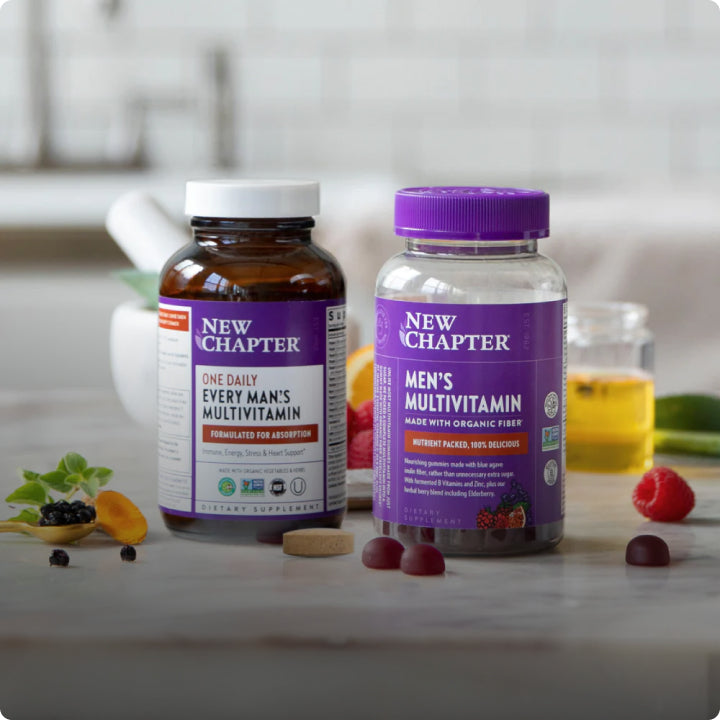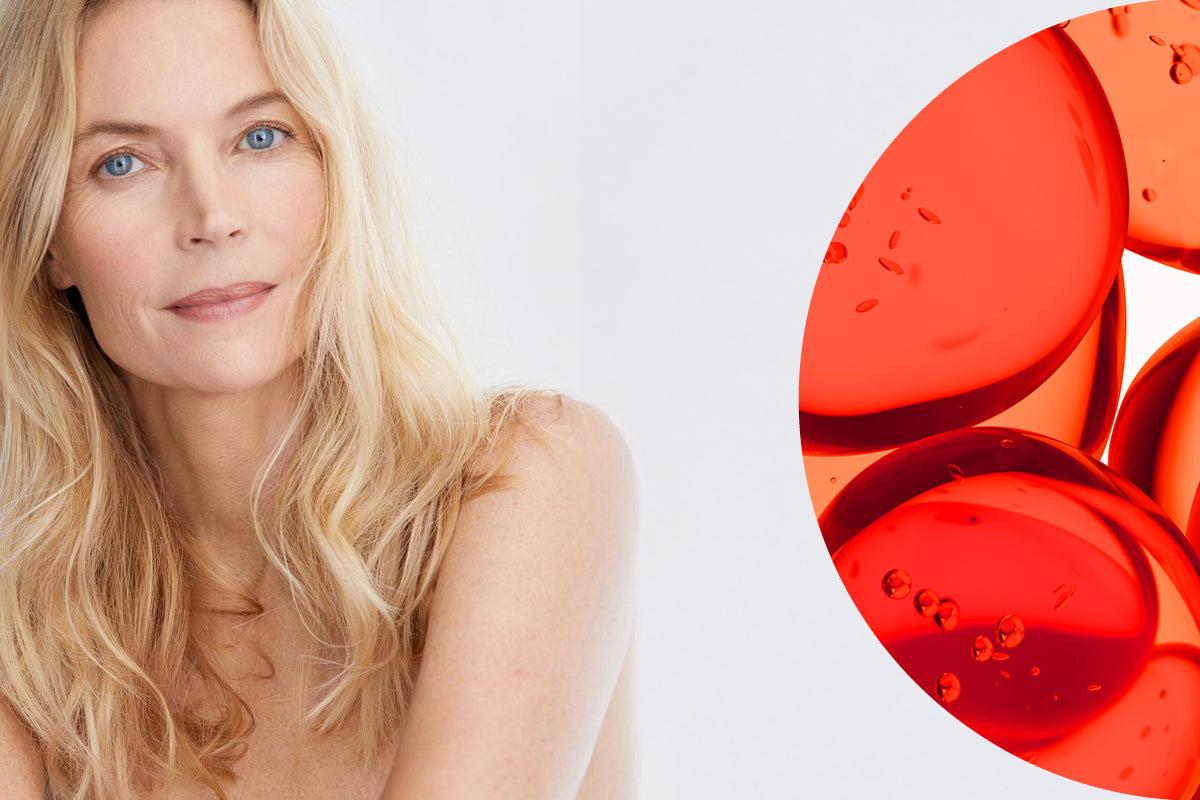“Take your vitamins,” they say. And for good reason! Vitamins and minerals are essential for maintaining overall health. These microscopic compounds occur naturally in food and help our bodies with everything from bone strength to brain function. But maybe you’re not tracking every nutrient you get from food each day. This is when multivitamin supplements can be a big help. A high-quality, complete multivitamin taken daily helps you fill nutritional gaps and feel confident you’re getting all the beneficial compounds you need.
This leads to a common question: If you're planning for pregnancy or already expecting, do you need a special prenatal multivitamin or is a standard multivitamin enough? Knowing the difference between a prenatal vitamin vs multivitamins can help you make informed choices about nourishing your and your baby’s wellness.
What is a multivitamin?
A multivitamin is a supplement that combines key micronutrients—vitamins and minerals—to support foundational health. They support your body’s structures and functions, everything from eye health to immune response to cellular energy metabolism. Most multivitamins include a core set of vitamins like A, C, D3, E, and B vitamins (including B6, B12, and folate). They may also include minerals such as selenium, magnesium, zinc, and iron. Multivitamins come in a variety of formats, including pills, capsules, gummies, and liquids, making it easy to find one that fits your routine. And, many are tailored to specific needs based on age, gender, or lifestyle, such as formulas for children over 2, women over 55, or active adults.
What is a prenatal multivitamin?
There’s a very important category of multivitamins crafted especially for people who are pregnant or planning to be: prenatal multivitamins. Unlike standard multivitamins, these blends typically have higher levels of certain nutrients that are critical for fetal development. As your body changes, your nutrient needs change, too. Prenatal supplements may include more folate or methylfolate, iron, and iodine. Some prenatal formulas also include thoughtful additions like ginger to help ease nausea (aka morning sickness), making them a gentle companion during a time of big changes. Ideally, prenatal vitamins should be taken before conception and throughout pregnancy to help ensure both mom and baby are getting the nutrients they need for a healthy start.
Key differences between multivitamins and prenatal vitamins
So, why are some nutrients so important for a healthy pregnancy that it’s important to take a specific multivitamin? Let’s look at the stories of 3 nutrients that are typically higher in prenatal multivitamins than standard multivitamins.
Adequate folate is crucial for fetal development
Possibly the most important reason to take a prenatal multivitamin is for the folate (vitamin B9). Folate is used by the body to make new cells, and is essential for proper neural tube development in babies. Folate supports your baby’s healthy brain and spine as they develop. In fact, it’s best to already have adequate folate in the body at the time of conception, since it starts supporting healthy development right away. That’s why it’s recommended to take a prenatal multivitamin with folate (or methylfolate, the most bioavailable form) if you’re trying to conceive or as soon as you know you’re pregnant. According to the American College of Obstetricians and Gynecologists, you should take a daily prenatal supplement with at least 400 micrograms (mcg) of folate, ideally starting at least 1 month before pregnancy
Your body needs more iron during pregnancy
Prenatal multivitamins are often high in iron. Your need for iron increases during pregnancy, going from a recommended 18 milligrams (mg) when not pregnant to a whopping 27 mg a day when pregnant. This is because your blood volume increases during pregnancy, and the iron helps your blood to transport oxygen effectively to your growing baby.
One note: If you prefer prenatal multivitamins in gummy or liquid form, they may not contain iron because it has a strong taste. Read labels for information on iron content. New Chapter’s Fermented Iron Complex one-daily tablets can be a great way to get needed iron during pregnancy (and it’s non-constipating!). Check with your health-care provider with any questions on the right iron intake for you.
Iodine needs increase to support healthy development
Iodine is needed to help mother & baby produce healthy thyroid hormones, and it also helps your baby’s brain and nervous system to develop properly. Experts know how important iodine is for pregnancy, and have set recommended dietary allowances accordingly:
- People over 19: 150 mcg
- During pregnancy: 220 mcg
- During lactation: 290 mcg
Keep in mind that people typically get some daily iodine from food, like iodized salt, fish, seafood, eggs, enriched bread, and seaweed. But there’s a reason iodine is higher in prenatal supplements: you and your baby need it! (New Chapter’s Perfect Postnatal multivitamin is also high in iodine for healthy thyroid and lactation support.*)
Essential nutrients in prenatal vitamins (and why they matter)
We’ve said a lot about why you’d take tailored prenatal vitamins. To help you shop, here’s a handy checklist of what to look for.
√ Folate (may be listed as folic acid, folate, or methylfolate): Prevents neural tube defects*
√ Iron: Supports increased blood volume and oxygen transport during pregnancy*
√ Calcium: Needed for mother & baby’s healthy bones and teeth*
√ Vitamin D3: Works with calcium to support skeletal development*
√ Iodine: Critical for thyroid health and brain development*
√ Vitamins B6 & B12: Support mother’s cellular energy*
√ Zinc: Supports immune function*
√ Ginger: For herbal nausea relief (morning sickness)*
√ DHA: This Omega-3 fatty acid supports brain & eye development (you can find it in Wholemega for Moms fish oil from New Chapter rather than our multivitamins)
Side-by-side comparison: Prenatal vitamins vs. multivitamin
You can see the choices our formulators made by comparing New Chapter’s family of prenatal multivitamins with our premier standard multi for women, Every Woman™’s One Daily.
| New Chapter multivitamins | Advanced Perfect Prenatal™ | One Daily Prenatal | One Daily Prenatal 35+ | Prenatal Gummies | Every Woman’s One Daily |
|---|---|---|---|---|---|
|
Calcium |
75 mg |
0 | 36.5 mg | 0 | 26 mg |
| Chromium | 45 mcg | 45 mcg | 90 mcg | 35 mcg | 18 mcg |
| Folate (includes methylfolate) | 680 mcg DFE | 680 mcg DFE | 680 mcg DFE | 680 mcg DFE | 400 mcg DFE |
| Iron | 20 mg | 20 mg | 20 mg | 0 | 3 mg |
| Iodine | 150 mcg | 150mcg | 150 mcg | 150 mcg | 75 mcg |
When to switch from a regular multivitamin to a prenatal multivitamin
Ideally, you’d start prenatal vitamins before conception to ensure folate is available during early fetal development. Then, continue taking prenatal multivitamins throughout pregnancy to be sure you and your baby are getting adequate amounts of necessary nutrients. Talk to your health-care provider about the best plan for you.
After giving birth, you could switch to a postnatal multivitamin that supports your health as you’re caring for your newborn. Perfect Postnatal by New Chapter helps replenish vital nutrients, maintain cellular energy, and support healthy mood.* It also has key nutrients that support healthy lactation and nourishing breast milk, if you’re nursing.
Check out our blog on prenatal vs postnatal multivitamins to get more details on key differences.
Practical considerations: Choosing the right vitamin
OK, so it makes sense you’d want a prenatal multivitamin if you’re planning a family or already pregnant. Moms tend to want the very best for their babies, so which multivitamin should you pick? In addition to checking out the levels of non-negotiable nutrients like folate, here are a few more tips.
Look for third-party tested formulations.
New Chapter prenatal multivitamins go through rigorous quality control to deliver products you can trust. You can rest assured that our ingredients meet the strict safety and purity requirements set by the FDA (Food & Drug Administration) and California Prop 65. They’re independently validated by the Non-GMO Project and certified gluten-free by NSF. You can also check for organic and kosher certifications.
Choose your favorite format!
Our prenatal multivitamins are available as one-daily tablets for convenience, and a 3-daily advanced formula for sustained nutrition throughout the day. We also have 100% delicious prenatal multivitamins in gummy form.
Take it easy on yourself.
New Chapter multis are gentle even on an empty stomach, so you can take them anytime. Being gentle on the stomach is especially important during pregnancy when queasiness (morning sickness) is common. Our prenatal multivitamins are easy to take and made to fit smoothly into your daily routine.
The bottom line
Moms and moms-to-be are all amazing. Pregnancy, trying to conceive, and prenatal care can be a LOT. Heck, you’re working hard even when you’re sitting on the couch! New Chapter is here for you, every step of the way, with thoughtfully crafted, nutrient-packed, highly effective prenatal options that are made with love for you and your baby. Upgrade your prenatal multivitamin and start your newest chapter with confidence that you and your baby are being cared for with thoughtful formulations that fill critical nutrient gaps.






